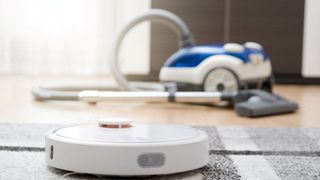You'll need a fully functioning, non-smelling vacuum cleaner to keep the house clean. But what happens when the vacuum does start to smell? The (bad) odors could be anything from smelling like damp dogs or rotting foods to a distinguished burning aroma.
It's an issue that can affect even the best vacuum cleaners, from stick vacuums to canister and upright vacuums to robot vacuums. A lot of the stink comes down to what you're actually vacuuming, but then there's the aftermath: how you remove the debris and what preventive measures you take to prevent it from happening again.
I've owned and tested many vacuum cleaners during my time as a product tester, and no two have been the same. Some have gotten in a tangle with hair, whereas others have had mechanical meltdowns that have affected suction performance.
I'm just as curious as you are about how to fix this problem, so I asked the experts for advice on the causes of a smelly vacuum and the solutions. Here's what I found out.
Why does my vacuum cleaner smell?
1. Bag / canister is full
Whether it's intentional or not, we vacuum spilled foods such as rice puffs, grated cheese, and dried foods so they're off the carpets and couches. The bag or canister on the vacuum can then act as a food waste bin as the food decays, which often won't get emptied as frequently as the food waste bin in the kitchen. The odor caused by this, mixed with dirt, dust, and fluff, can be revolting.
This means that you don't always have to wait until the canister or vacuum bag is full to empty it into the trash, especially if you know what you've vacuumed will cause a whiff not before too long.
Jade Piper, Operations Manager at Better Cleans, advises: "Empty your vacuum bag or canister when it's about half full. If you wait too long, your vacuum might not work as well anymore."
Jade is the Operations Manager of BetterCleans. With a proven track record in the industry, she skillfully oversees all operations, ensuring top-notch service delivery to clients. Jade's passion for creating tidy and welcoming spaces extends beyond her professional life, making her a true advocate for a clean and happy home environment.
Alternatively, a robot vacuum that self-empties, such as our #1 rated Eufy X10 Pro Omni, will help to keep on top of any roaming odors. Just don't get complacent with these; they still need emptying, which is on average every 60 days—or until you notice a smell.
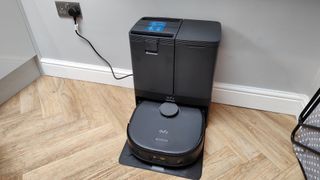
2. You've vacuumed wet surfaces
Unless you have one of the best wet/dry vacuum cleaners, repeating this isn't a good idea because it could damage the vacuum, and the moisture can turn into dampness and, later, mold. David Chapman, flooring expert and founder of custom logo mat company Ultimate Mats, shares: "When cleaning up spills, blot the wet surface with a cloth or mop, and ensure that the area is dry before vacuum cleaning. "
If you vacuum over a wet surface, be sure to clean and dry the canister or replace the bag. Check the brushbar, too, to ensure you're not spreading dampness across other surfaces.
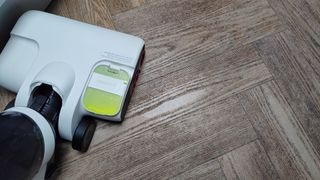
3. Filters are clogged
Vacuum cleaner filters are often the source of many woes. When clogged, they can affect the suction and prevent the capture of airborne allergens, all while causing a stink.
Chapman says: "...people will often overlook the cleaning and maintaining vacuum filters, brushes and attachments. Remove the filters and brushes to remove any attached hair, fibers, or debris. If washable, rinse them under lukewarm water, ensuring the water isn’t too hot."

David Chapman, Owner of Custom Logo Mat Company, Ultimate Mats and expert in home cleaning, dust prevention and workplace injury. David began his career in the mat industry working as a manufacturer’s rep alongside his son, providing anti-fatigue mats to manufacturing plants. While working as a rep, David spotted a real gap in the market for providing businesses with high quality mats at reasonable prices.
In 2005, David and his son set up their own family business, Ultimate Mats. A year later, his daughter also joined the family business. For almost 20 years, Ultimate Mats have been providing the highest quality anti-fatigue mats, entry mats and custom logo mats, all made with the finest materials available, and partnering with the top mat manufacturers and suppliers in the US.
4. Hair is tangled
The above point brings us to the hair wrapping around the brushbar and accessories. Long, short, and pet hair can be a nuisance when wanting to quickly vacuum around the home, as it traps dust and prevents it from being banished to the bag or canister.
Pet hair is often found in clumps around the home and has a distinctive smell. Piper advises: "Mix equal parts of warm water and white vinegar in a bowl. The warm water helps loosen dirt, and the vinegar is like a natural cleaner. Pop your brush roll into the water and vinegar mix. Leave it there for about 15-30 minutes. After the soak, grab an old toothbrush and give your brush roll a gentle scrub, especially on any stubborn gunk. Rinse, air dry, and once the filter and dustbin are ready, reassemble the vacuum and give it a test run to ensure everything's in working order."
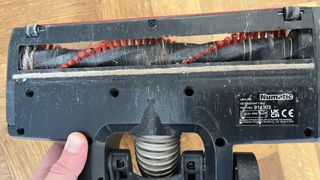
Alternatively, owning a vacuum cleaner for pet hair would be a good idea to prevent hair from getting in a wrap and to keep bad odors at bay. One of our highly recommended pet vacuum cleaners is the Shark Stratos, which has an odor-neutralizer built-in to the floorhead and has an anti-hair wrap.
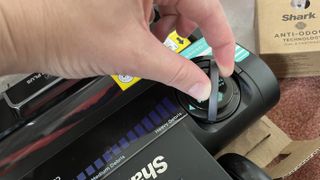
5. It's stored in the wrong place
"It is common to store vacuum cleaners in a cupboard under the stairs or another dark place in the home lacking ventilation.
"These conditions can contribute to the build-up of mold and bacteria, which causes your vacuum cleaner to smell bad. Be sure to keep your vacuum in a well-ventilated area of the home, such as by a doorway or in a garage. This should help to improve both the smell and the lifespan of your vacuum cleaner." says Chapman.
Upright vacuum cleaners can often stand up on their own, whereas cordless vacuum cleaners arrive with a wall-mounted doc, so you'll have the freedom with both to position them where is suitable.
6. Motor is overheating
When the motor is overheating, it could be for all of the above reasons or because it is deteriorating. What will give away the motor's status is the noise and, yep, the smell.
This smell will be a burning smell. As soon as you detect this, stop using the vacuum cleaner. By elimination, it would be worth cleaning the canister or replacing the bag and the accessories. If that fails, an option would be to get it serviced, or you will look at replacing it. You needn't fret about spending a small fortune on a vacuum cleaner. We've tried vacuum cleaners for under $200, which did a perfectly good job - although you may need to stay equipped with scissors to occasionally free the brushbar from hair.
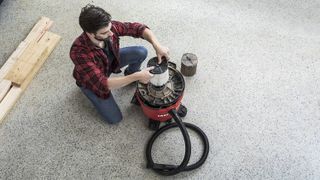
7. Mechanical issue
A mechanical issue with a vacuum cleaner can be anything from a seized rotating brush bar to a fraying power cable or loose plug. Either of these issues could cause a vacuum cleaner to smell as it'll blow out air from the canister or create a burning smell.
Rocky Vuong from Calibre Cleaning Limited notes that maintenance should be done regularly and adds, "Check for any blockages in the machine, as they can lead to decreased efficiency. They can also result in overheating, thus releasing a burning smell.
"Ensure that all parts of the machine are working properly, and call for a professional in case of bigger issues." It would also be a good idea to stop using the vacuum cleaner to prevent any further damage.

Rocky Vuong is a dedicated professional cleaner, organizer, and the visionary founder of Calibre Cleaning Limited, a leading cleaning service that has transformed the way homes and businesses achieve pristine environments. With years of experience in the cleaning industry, Rocky has established himself as an authority on creating organized, efficient, and spotless spaces.
If it's time to replace your vacuum cleaner, check out our vacuum deals round-up. With Memorial Day sales looming, you could find a top-rated brand for less throughout the sales period.
